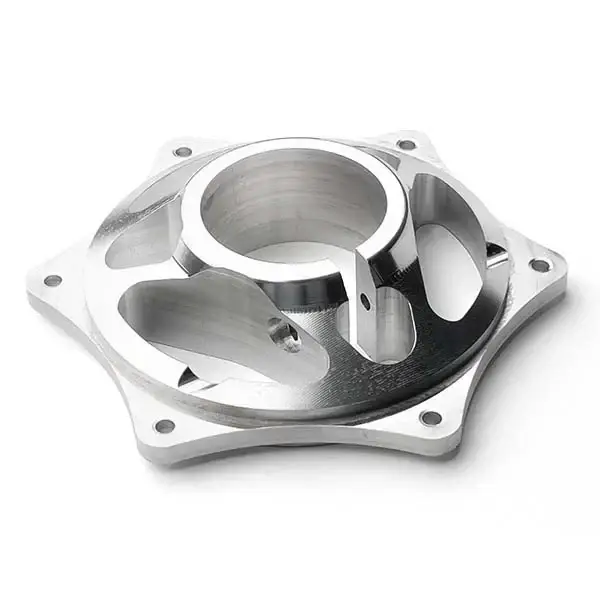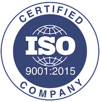Aluminium 7021
High-strength alloy for wear, hardness and toughness
Also known as AlZn4.5Mg1, aluminium 7021 is an ideal alloy for applications requiring high mechanical performance. It offers an excellent combination of hardness, toughness, and resistance to wear and corrosion, making it perfect for industrial use and precision engineering.

PROS
- High Strength
- Good Wear Resistance
- Dimensional Stability
- High Heat Transfer
CONS
- Limited Weldability
- Reduced Formability
MAIN FEATURES
- Machining process: CNC Machining
- Tolerances: ISO 2768-1 fine (f) or medium (m) class. Info
- Max size: 500x500x400 mm ; 19.7x19.7x15.7 in
- Lead time: <4 days
ALUMINUM 7021 CNC MACHINED VIDEO GALLERY
High Strength
Aluminium 7021 is a high-strength alloy suitable for components that must withstand high stresses or loads. The unique combination of alloying elements in Aluminium 7021, including zinc, magnesium and copper, creates a robust material that can withstand harsh environments, increasing the longevity of the final part.
Good Wear Resistance
The hardness of the alloy helps to reduce the risk of surface degradation, wear and tear, making it ideal for parts that are subject to friction or abrasion in their operating environment.
High Heat Transfer
Aluminium 7021 has a superior thermal conductivity, making it an excellent choice for applications requiring rapid heat dissipation. This can be particularly advantageous for engine or machinery parts that generate a significant amount of heat and where efficient heat transfer can prevent overheating and optimize performance.
IMAGE GALLERY
QUOTE NOW YOUR PARTS
free instant quoteCOMMENT
Aluminium 7021 offers a number of unique properties that can be advantageous for a number of applications. If you understand these attributes and align them with your project requirements, you can get the most out of what this unique alloy has to offer.
Pros
• High Strength
One of the defining characteristics of Aluminum 7021 is its impressive mechanical strength. This metal alloy, due to its distinctive mix of alloying elements such as zinc, copper, and magnesium, results in a material that is exceptionally strong and durable. This strength can provide added durability and lifespan to the final component, particularly in applications that need to endure high levels of stress or heavy loads.
• Good Wear Resistance
The hardness of Aluminium 7021 makes it a robust choice with high wear resistance. Components made with this alloy are less liable to degrade, making it suitable for applications involving high levels of abrasion or friction. This can lead to a longer life of mechanical parts and potential cost savings in the long run.
• Dimensional Stability
Aluminium 7021 has a low coefficient of thermal expansion, ensuring excellent dimensional stability. Parts made with this material resist changes in size or shape under varying temperature conditions. This quality is very advantageous in areas where operations take place in unpredictable or extreme temperature scenarios.
• High Heat Transfer
Aluminium 7021 thermal conductivity is superior to that of many other materials, making it ideal for parts that require fast and efficient heat dissipation. This attribute is particularly useful in heat-generating machinery or engine parts, where efficient heat transfer can prevent overheating and ensure optimal performance.
Cons
• Limited Weldability
Not all aluminum alloys are created equal when it comes to welding. Despite its many strengths, Aluminum 7021 falls short in this regard, with limited weldability compared to other aluminum alloys. This can pose a challenge for projects that require extensive welding, limiting the design and assembly options.
• Reduced Formability
Aluminum 7021 has a lower formability compared to other aluminum alloys. This means it might not be as easy to bend, shape, or work into complex geometries, potentially restricting the scope of design options. However, it is important to keep in mind that its high strength and wear resistance can often overcome this limitation, depending on the specific application.
LET'S TAKE A LOOK AT HOW ALUMINIUM 7021 COMPARES TO OTHER COMMON ALUMINIUM ALLOYS
Aluminum 7021 vs. 6082
Aluminium 6082, also known as "structural alloy", has a similar composition to 7021, but is more commonly used in Europe. While 7021 is known for its greater mechanical strength and dimensional stability, 6082 offers good corrosion resistance, weldability and formability. However, in applications requiring higher strength, 7021 may be the better choice.
Aluminum 7021 vs. 7075
Aluminium 7075 is one of the highest strength aluminium alloys available, even exceeding the strength of 7021. It is often used in applications requiring a high strength-to-weight ratio, such as aircraft structures. However, 7075 is less resistant to corrosion than 7021 and its weldability is poorer.
Aluminum 7021 vs. 5083
Aluminium 5083 is a high-quality aluminium alloy known for its outstanding performance in extreme environments, with excellent resistance to seawater attack and industrial chemicals. Although 5083 is highly resistant to corrosion, its strength is not equal to that of 7021. If the application requires greater mechanical strength, 7021 may be a better choice.
Aluminum 7021 vs. 2011
Aluminium 2011, often used for screw machine products, is not as strong as 7021 but has excellent machinability. Although 2011 can be useful for detailed and intricate parts, it is not suitable for high-load or high-stress applications, where 7021 excels.
In conclusion, Aluminium 7021, with its superior mechanical strength, wear resistance and dimensional stability, is able to compete with other aluminium alloys. However, depending on the application and specific requirements, you might prefer 6082 for its corrosion resistance, 7075 for its extreme strength, 5083 for its performance in harsh environments or 2011 for its machinability. By understanding the characteristics of each alloy, you will be able to make the most conscious decision based on your project requirements.
Best applications:
The properties of Aluminum 7021 make it ideal for a variety of applications across many industries. Here are some of the key areas where this aluminum alloy shines.
Transportation and Automotive Industries
Thanks to its excellent strength-to-weight ratio, Aluminium 7021 is often used in the production of vehicle parts. From bus and truck bodies to railway car components, this alloy offers lightweight yet durable solutions that can withstand everyday wear and tear.
Aerospace
The superior mechanical strength and wear resistance of Aluminium 7021 make it a suitable choice for various components in the aerospace industry. It can be used in the production of parts such as fittings and couplings, bulkheads and even some types of aircraft wings.
Marine
Although other aluminium alloys, such as 5083, may offer better corrosion resistance in marine environments, the high strength and wear resistance of 7021 may find application in parts where these characteristics are a priority, such as structural components of ships.
Machinery and Equipment
In the manufacturing sector, the durability and strength of Aluminium 7021 are advantageous for creating parts and equipment that can withstand high-stress operations. This can include everything from high-performance machinery parts to structural components.
Conclusions
In conclusion, Aluminium 7021 is a popular material choice in various industries due to its impressive mechanical strength, wear resistance and superior dimensional stability. Although this alloy is not as common as its counterparts such as 6082 or 7075, it definitely excels when it comes to delivering high performance under harsh conditions.
It is essential to remember that the value of Aluminium 7021 derives not only from its autonomous qualities, but also from the way these qualities are exploited in specific applications. It is this application-oriented value that has allowed Aluminium 7021 to cut a niche for itself, particularly in sectors where strength, durability and resilience are critical.
However, as with any engineering decision, the choice of Aluminium 7021 must be the result of a comprehensive evaluation of the specific requirements of the project. While this alloy may be perfectly suited for one application, other materials may outperform it under different conditions or requirements. For this reason, it is always advisable to consult materials specialists or use resources such as our material comparison guide to ensure you make the most informed choice for your project.
"★★★★★ As a designer, I opted for Aluminium 7021 parts made by Weerg for my project. I was impressed by the superior mechanical strength and dimensional stability of Aluminium 7021. The precision and finish of Weerg work were second to none. The support from the Weerg team was exceptional, with quick responses and valuable advice. I highly recommend Aluminium 7021 and Weerg!"
PROPERTIES
| Tensile breaking load | 460 MPa |
| Modulus of elasticity | 69 GPa |
| Elongation at break | 9,4 % |
| Density | 2,9 g/cm³ |
| Melting temperature | 630°C |
| Hardness | 120 HB |
| Yield strength | 390 MPa |
Questions and answers
7021 aluminium is a 7000 series alloy, highly valued for its exceptional mechanical properties and excellent dimensional stability. It is primarily composed of aluminium with the addition of zinc and magnesium, which enhance its strength and fatigue resistance. One of the key features of 7021 aluminium is its ability to maintain precise dimensions during both machining processes and final applications. This makes it ideal for components requiring tight tolerances and reliable long-term performance. The alloy also offers good corrosion resistance, although protective treatments may be needed in extreme environments. Additionally, 7021 aluminium is highly machinable with CNC equipment, enabling the production of complex components with high-quality surfaces, minimising the need for post-processing.
7021 aluminium is widely used across a range of industries thanks to its versatility and excellent mechanical properties. In the plastics mould industry, it is extensively utilised for its dimensional stability during machining and usage, enabling the production of highly precise and durable moulds. In the aerospace sector, this alloy is chosen for lightweight yet strong structural components capable of withstanding mechanical stresses and vibrations. Similarly, in the automotive industry, 7021 aluminium is employed for parts such as supports, frames, and panels that demand a combination of lightness and strength. It is also used in the manufacture of industrial tools and technical equipment, where durability and precision are critical. Thanks to its fatigue resistance and high-temperature performance, it is ideal for components exposed to repeated use and challenging operating conditions.
7021 aluminium is characterised by superior mechanical properties that make it particularly suitable for advanced technical applications. It has a typical tensile strength of approximately 440 MPa and a yield strength of 370 MPa, ensuring the material's ability to withstand heavy loads without permanent deformation. The Brinell hardness of 7021 aluminium is around 120 HB, providing good wear resistance and increased durability under intensive use. In addition to its mechanical strength, this alloy excels in fatigue resistance, making it ideal for components subjected to cyclic loads or constant vibrations. Another key feature is its dimensional stability, ensuring that the material retains its shape and dimensions even during high-precision machining or applications exposed to temperature and pressure variations.
7021 aluminium offers several advantages that set it apart from other alloys. These include its exceptional dimensional stability, which makes it ideal for precision applications, and its high mechanical properties, such as tensile and fatigue resistance. This makes it an excellent choice for structural and technical components in sectors like aerospace, automotive, and mould production. However, compared to other alloys like 6061 or 5083, 7021 aluminium may exhibit lower corrosion resistance in particularly aggressive environments, requiring additional protective treatments to ensure greater durability. Additionally, while its machinability is optimal, it may be slightly less easy to work with compared to more ductile alloys. Despite these limitations, 7021 aluminium remains one of the best choices for applications requiring precision, robustness, and strong fatigue resistance.
QUOTE IN 1 SECOND WITHOUT COMMITMENT
DON'T WAIT: UPLOAD YOUR 3D FILE AND GET A QUOTE FOR YOUR PARTS NOW!
Upload your 3D file to get one step closer to manufacturing your parts.
free instant quote



